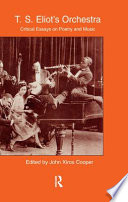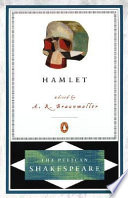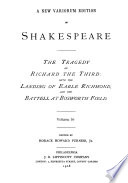 | Stanley Wells - 1997 - 438 páginas
...Hamlet, it is often said, 'is full of quotations', and some of these are obviously 'poetical' passages But look, the morn in russet mantle clad Walks o'er the dew of yon high eastern hill (1.1.147-8) or There is a willow grows aslant a brook That shows her hoar leaves in the... | |
 | T. S. Eliot - 1997 - 146 páginas
...inconsistent scenes which even hasty revision should have noticed. The versification is variahle. Lines like Look, the morn, in russet mantle clad. Walks o'er the dew of yon high eastern hill, are of the Shakespeare of Romeo and Juliet. The lines in Act v. sc. ii., Sir, in my heart... | |
 | Emerson R. Marks - 1998 - 428 páginas
...rapidly without incongruous effect. Eliot points out that by Horatio's lyrically figurative exclamation, But look, the morn in russet mantle clad Walks o'er the dew of yon high eastward hill, "we are lifted for a moment beyond character, but with no sense of unfitness of the words coming, and... | |
 | Stephen Orgel, Sean Keilen - 1999 - 356 páginas
...Coleridge's Writings on Shakespeare, ed. Terence Hawkes (New York, i959), p. i431 home to his confine: "But look, the morn, in russet mantle clad,/ Walks o'er the dew of yon high eastward hill" (i66-67). Each of these moments has a distinct symbolic valence, and each one corresponds to some part... | |
 | Richard Woodman - 2000 - 228 páginas
...like, Bones', put in Rogers. Lettsom ignored the first lieutenant and produced another quotation: ' "But look, the morn, in russet mantle clad, Walks o'er the dew of yon high eastern hill . . ." ' 'But it ain't high, Mr Lettsom, thus proving Shakespeare did not know the lie... | |
 | John Xiros Cooper - 2000 - 378 páginas
...do in part believe it" (I, i, 1 66), contrasts with the increased poeticism of the two that follow: "But, look, the morn, in russet mantle clad, / Walks o'er the dew of yon high eastern hill." Horatio's lyricism illuminates an instance of what Eliot theorized as "beyond character,"... | |
 | Jan H. Blits - 2001 - 420 páginas
...Hamlet in a wholly metaphorical sense. Breaking up the guards' watch in the opening scene, Horatio says: But look, the morn in russet mantle clad Walks o'er the dew of yon high eastward hill. (1.1.171-72) Interestingly, by personifying the rising sun with a pun on "mourn," the lovely lyrical... | |
 | William Shakespeare - 2001 - 212 páginas
...164 So hallowed and so gracious is that time. HORATIO So have I heard and do in part believe it. 166 But look, the morn in russet mantle clad Walks o'er the dew of yon high eastward hill. Break we our watch up, and by my advice Let us impart what we have seen tonight 170 Unto young Hamlet,... | |
 | George Thaddeus Wright - 2001 - 348 páginas
...there is no point in such description; anyone present can see for himself. If some Horatio says to us, But look, the morn, in russet mantle clad, Walks o'er the dew of yon high eastward hill, (Hamlet 1.1.166-67) we reply impatiently, "I see it, I see it!" The exception occurs when what is going... | |
 | William Shakespeare - 2001 - 656 páginas
...III, v, 7; 'yon gray lines That fret the clouds are messengers of day.' — Jul. CaS., II, i, 103; 'look, the morn, in russet mantle clad, Walks o'er the dew of yon high eastward hill.' — Hamlet, I, i, 166; 'Full many a glorious morning have I seen Flatter the mountain tops with sovereign... | |
| |